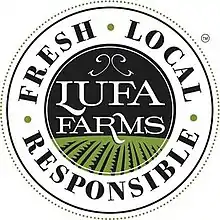45°31′54″N 73°39′20″W / 45.53162°N 73.65559°W
 | |
| Type | Private |
|---|---|
| Founded | 2009 |
| Headquarters | , |
Key people | Mohamed Hage (Founder, CEO) Kurt Lynn (Founding Member, Vice President) Lauren Rathmell (Founding Member, Greenhouse Director) Yahya Badran (Founding Member, Director of Engineering) Dave Furneaux(Chairman) |
| Products | Subscription-based food ecommerce |
Number of employees | 200 |
| Website | lufa.com |

Lufa Farms is an urban agricultural company located in the Ville Saint-Laurent neighborhood of Montreal, Quebec. The company states its mission is to grow food where people live and grow it more sustainably.[1][2] The company, founded in 2009, has installed commercial greenhouses on the rooftops of several large industrial buildings in the greater Montreal area.[2]
Description
Lufa Farms acts on the belief that that the current food system is unsustainable and that cities need to transition to a new food production model that is s self-sufficient enough to continue to feed a growing metropolitan population. The company achieves their goal by growing more food closer to where people live, while using less space and resources to minimize environmental impacts.[2][3]
With three rooftop greenhouses in the Montreal area, the company currently has 138,000 square feet of growing space where dozens of types of vegetables are grown. The company currently delivers around 20,000 baskets every week to over 500 pick-up points across Quebec,[2] and in 2020, opened their fourth greenhouse, the company's largest, with 164,000-square-feet.[2]
History
The company was started by Mohamed Hage, inspired by the rooftop gardens in Lebanon. Lauren Rathmell, Kurt Lynn, and Yahya Badran were also involved in the founding.[1][4]
Lufa Farms opened its first commercial rooftop greenhouse in the Ahuntsic borough of Montreal. The greenhouse had 31,000 square feet of vegetable production and housed the company's herb, micro-greens, cucumber, and pepper production using both horizontal and vertical farming systems.[1][3]
2011
The company harvested its first rooftop vegetables and began delivering weekly baskets to its first customers. At that time, the company grew only 40 varieties of vegetables and delivered them to about 200 customers.[1]
2013
Lufa Farms built their second rooftop greenhouse in the neighboring city of Laval, measuring 43,000 square feet and currently housing the company's tomato and eggplant production.[3] In order to offer more variety, they partnered with hundreds of local farmers and food makers to offer Lufa Farms' rooftop-grown vegetables, as well as thousands of seasonal field fruit and vegetables, baked-to-order bread, seafood, and more. These partnerships brought the launch of the company's online farmers’ market, the Marketplace.[1]
2016
The company went through a period of growth. The total number of weekly baskets exceeded 10,000 and the company subsequently doubled its workforce. It was also the year that Lufa Farms' eco home delivery by electric car was launched and the company became cash-flow positive.[1]
2017
Lufa Farms built its third rooftop greenhouse in the Anjou suburb of Montreal. This greenhouse, which was both their largest and most technologically advanced, grew the company's growing space to 138,000 square feet.[1]
2019
The company outgrew their Ahuntsic location, and moved their main offices and distribution centre to Ville Saint-Laurent where they began construction on their fourth, and largest rooftop greenhouse.[1][5]
2020
The company is forecasting the completion of their Ville Saint Laurent greenhouse for the spring of 2020. Once finished, it will become the world's largest rooftop greenhouse at 164,000 square feet (about three football fields) and will house the company's complete tomato and eggplant production. The surface area will be greater than all three of their current greenhouses combined and will double the company's growing capacity.[1][6]
Farming techniques
Lufa Farms grows its crops on rooftops.[3] In its operations, it uses a coconut fiber substrate using a hydroponic system. Water is recirculated and rain and meltwater are added into the closed-loop system.[3]
Lufa Farms does not use synthetic herbicides, fungicides, or pesticides. It relies primarily on bio-controls consisting of the introduction of predatory insects.[3]
Green waste is composted and sold on Lufa Farms' Marketplace or is sent to municipal or other partner composting sites.[3]
Gallery
 Mohamed Hage, founder of Lufa Farms.
Mohamed Hage, founder of Lufa Farms. Plant science team member.
Plant science team member. Vegetables harvest.
Vegetables harvest. Preparation of vegetable baskets.
Preparation of vegetable baskets. Boston lettuce.
Boston lettuce. Tomato rows.
Tomato rows. Chard Growing in nutrient film system.
Chard Growing in nutrient film system.
 Construction of the new greenhouse in Laval, Quebec (2013).
Construction of the new greenhouse in Laval, Quebec (2013).
See also
References
- 1 2 3 4 5 6 7 8 9 "Lufa Farms". montreal.lufa.com. Retrieved 2020-03-09.
- 1 2 3 4 5 Brownstein, Bill (November 21, 2019). "Montreal's Lufa Farms reaches new heights". Montreal Gazette. Retrieved 2020-03-09.
- 1 2 3 4 5 6 7 "Discover our farms". montreal.lufa.com. Retrieved 2020-03-09.
- ↑ "La générosité de la serre Lufa | C'est bien meilleur le matin". Retrieved 2020-03-09.
- ↑ "It's moving time!". montreal.lufa.com. Retrieved 2020-03-09.
- ↑ Farms, Lufa. "Lufa Farms breaks ground on their fourth greenhouse, making Montreal home to the world's largest rooftop farm". newswire.ca. Retrieved 2020-03-09.